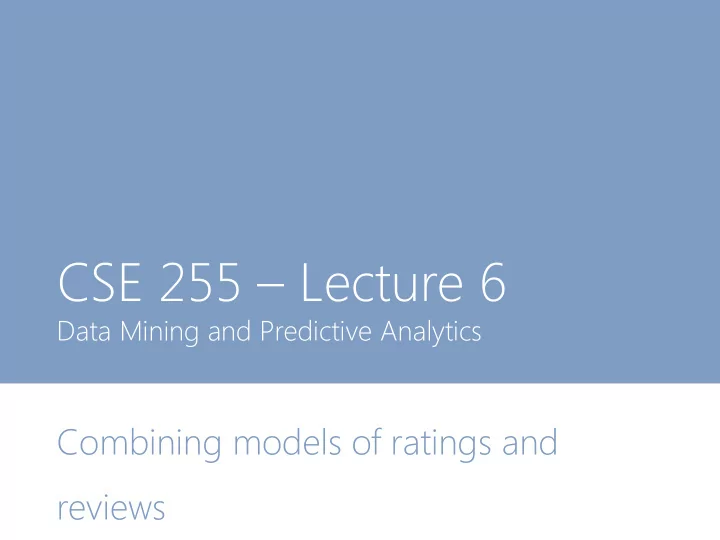

CSE 255 – Lecture 6 Data Mining and Predictive Analytics Combining models of ratings and reviews
Ratings – Latent Factor Models Two models we’ve seen so far: 1: Latent Factor Models (Lecture 5) learn my preferences, and the product’s properties my (user’s) HP’s (item) “preferences” “properties” e.g. Koren & Bell (2011)
T ext – Latent Dirichlet Allocation Two models we’ve seen so far: 2: Topic models (Today!) Document topics LDA (review of “The Chronicles of Riddick”) Sci-fi Action: space, future, planet,… action, loud, fast, explosion,… Blei & McAuliffe (2007)
Low-dimensional representations • Both of these models try to summarize complex data into low-dimensional representations • If both of these models are based on the same principle (project high-dimensional data into low-dimensional spaces), can we combine them? • In other words, can we come up with low- dimensional representations that capture the common structure present in both types of data simultaneously?
Why combine ratings and text? Reason 1 (modeling): it takes lots of ratings to estimate high-dimensional models of users and items – we might get away with fewer reviews Reason 2 (understanding): standard rating models have no interpretations – text might help us explain opinion dimensions ACM RecSys 2013 (w/ Leskovec)
Combining ratings and reviews The parameters of a “standard” recommender system user/item offset user/item bias latent factors are fit so as to minimize the mean-squared error where is a training corpus of ratings
Combining ratings and reviews transform Review “topics” Item “factors” Our approach: find topics in reviews that inform us about opinions
Combining ratings and reviews We replace this objective with one that uses the review text as a regularizer: rating parameters LDA parameters
Model fitting Repeat steps (1) and (2) until convergence: Step 1: fit a rating model regularized by solved via gradient ascent using L-BFGS the topics (see e.g. Koren & Bell, 2011) Step 2: identify topics (solved via gradient ascent using L-BFGS) that “explain” solved via Gibbs sampling the ratings (see e.g. Blei & McAuliffe, 2007)
Outcomes – rating prediction Rating prediction: • Amazon (35M reviews): 6% better than state-of-the-art • Yelp (230K reviews): 4% better than state-of-the-art New users: • Improvements are largest for users with few reviews: !
Outcomes – interpretation Interpretability: Topics are highly interpretable across all datasets Beers Musical Instruments pale ales pale ales lambics lambics dark beers dark beers spices spices wheat beers wheat beers drums drums strings strings wind wind mics mics software software cartridge guitar reeds mic software ipa ipa funk funk chocolate chocolate pumpkin pumpkin wheat wheat cartridge guitar reeds mic software pine pine brett brett coffee coffee nutmeg nutmeg yellow yellow sticks sticks violin violin harmonica harmonica microphone microphone interface interface grapefruit grapefruit saison saison black black corn corn straw straw strings strings strap strap cream cream stand stand midi midi citrus citrus vinegar vinegar dark dark cinnamon cinnamon pilsner pilsner snare snare neck neck reed reed mics mics windows windows ipas ipas raspberry raspberry roasted roasted pie pie summer summer stylus stylus capo capo harp harp wireless wireless drivers drivers piney piney lambic lambic stout stout cheap cheap pale pale cymbals cymbals tune tune fog fog microphones microphones inputs inputs citrusy citrusy barnyard barnyard bourbon bourbon bud bud lager lager mute mute guitars guitars mouthpiece mouthpiece condenser condenser usb usb floral floral funky funky tan tan water water banana banana heads heads picks picks bruce bruce battery battery computer computer hoppy hoppy tart tart porter porter macro macro coriander coriander these these bridge bridge harmonicas harmonicas filter filter mp3 mp3 dipa dipa raspberries raspberries vanilla vanilla adjunct adjunct pils pils daddario daddario tuner tuner harps harps stands stands program program
Outcomes – usefulness prediction What makes a review useful? “Useful” reviews discuss topics in proportion to their importance Do the topics in my review match those that the community find important?
Questions?
Recommend
More recommend